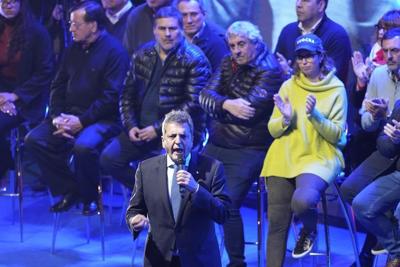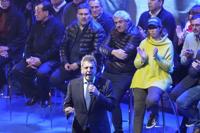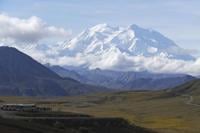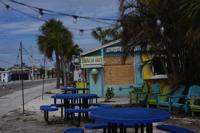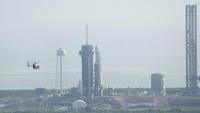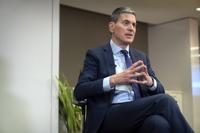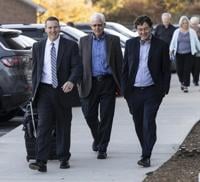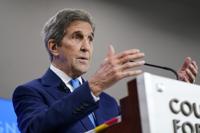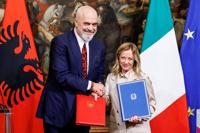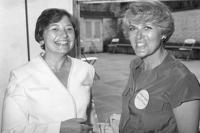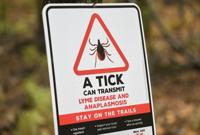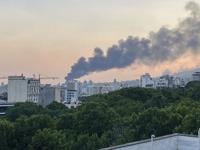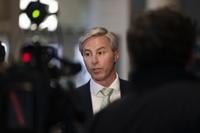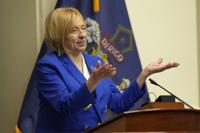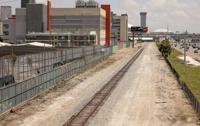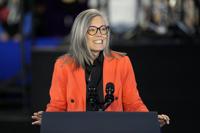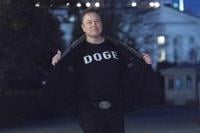BUENOS AIRES, Argentina (AP) — Argentina's national primary election Sunday won’t just help determine which candidates will be running in the country's October presidential vote, but could impact the economy even before then.
A strong showing by the opposition coalition would be cheered by markets in an election that will also test the national appeal of an eccentric right-wing anti-establishment candidate who is an admirer of former President Donald Trump.
The primary is seen as a thermometer of voter preference ahead of the Oct. 6 election, which is expected to shift Argentina to the right with the current left-leaning government bottoming out in the polls amid rising poverty, a rapidly depreciating currency and galloping annual inflation that tops 100%.
Sunday’s primary officially serves two purposes: determine the candidates that will run in the October election and weed out any candidates who don’t receive at least 1.5% of the vote. But it also serves as a massive, nationwide opinion poll in a country where pre-election polls have been notoriously wrong in the past.
The primary can have an economic impact. Four years ago, an unexpectedly strong showing by now-President Alberto Fernández led to a sharp depreciation of the currency as markets saw the primary results indicating that business-friendly President Mauricio Macri was on his way out.
The local currency, the Argentine peso, has seen its value plunge in parallel markets ahead of Sunday’s vote. Stringent capital controls mean that access to the official foreign exchange market is extremely limited, so parallel rates have flourished.
Economists will be watching to see signs that the main center-right opposition could win the presidential election outright and avoid a second round runoff in November.
“There is enthusiasm, especially outside of Argentina, about a profound regime change, but without going to the opposite extreme,” said Mariano Machado, principal analyst for the Americas at Verisk Maplecroft, a global risk intelligence firm.
The wildcard of the race is upstart populist candidate Javier Milei, who has gained popularity thanks to his and has found followers among those who are tired of politics as usual. His unorthodox proposals that include dollarizing the economy and getting rid of the Central Bank have found particular backing among the young.
“We’re fed up with the status quo, with the same old thing, with the same last names that are on the ballot, we want to change things up a bit, and give an opportunity to someone who nobody knows if he will do well, but we’re going to give him a chance,” Efraín Viveros, a 20-year-old nursing student said Monday at Milei’s closing campaign rally in Buenos Aires.
A strong showing for the main center-right coalition could buoy the market, but a stronger-than-expected showing for Milei would likely send the local currency, the peso, tumbling and cause general disarray in the markets due to uncertainty over his policies.
The main presidential contenders all represent a rightward shift away from Fernández, who is not seeking reelection and has been largely absent from the campaign. Also largely absent has been his vice president, Cristina Fernández, who was the country’s president from 2007 to 2015.
In the currently ruling coalition, Union for the Homeland, there is little doubt that Economy Minister Sergio Massa, a market-friendly politician, will receive the nomination although he is facing a challenge from a leftist candidate, Juan Grabois.
A key contest Sunday will play out in the center-right United for Change opposition coalition with Buenos Aires Mayor Horacio Rodríguez Larreta facing off against former Security Minister Patricia Bullrich to determine who will be its candidate. Pollsters say the winner of this race will have a strong chance of becoming president.
Regardless of who comes out on top, analysts will be watching closely whether a strong showing by the opposition could suggest an outright victory in October without a runoff.
“While we expect a volatile political transition given macroeconomic woes, the (primaries) outcome could improve market sentiment, supported by a likely policy shift next year,” said the Institute of International Finance, a Washington-based association of the financial services industry, in a recent report.
Milei was the only major candidate who held his final campaign rally. Other called off what were supposed to be their final events before the vote following the .
The death of Morena Domínguez in an attack by two motorcycle-riding thieves in the Buenos Aires province district of Lanús, left the country reeling and put crime at the forefront of a campaign that had been dominated by economic issues.
Also likely to impact the final days before the vote was the Thursday death of a leftist political activist, who suffered a heart attack while being detained by police .
Besides presidential voting in October, about half of Argentina’s lower house of Congress and one-third of the Senate will be up for grabs. Voting is mandatory in Argentina but the fine for failing to cast a ballot is largely symbolic. Recent national elections have seen a participation rate of around 70%.
—�Ĕ�Ĕ
Associated Press journalists Débora Rey and Almudena Calatrava contributed to this report.

